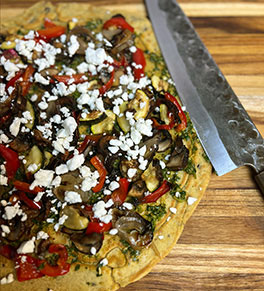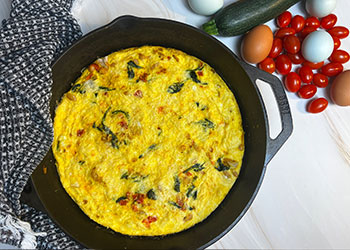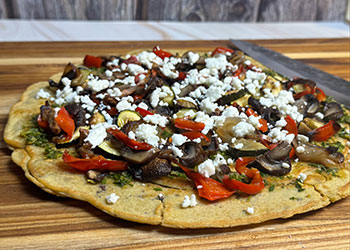MIND food: Blissful recipes to boost brain health

Have you heard of the MIND diet? Short for Mediterranean-DASH Intervention for Neurodegenerative Delay, it is a hybrid of the Mediterranean and DASH diets that is specifically designed to promote brain health and reduce the risk of cognitive decline.
Research has shown that sticking closely to the MIND diet for about five years can lower the risk of developing Alzheimer's disease by as much as 53%. Even moderate adherence was linked to a 35% reduction in risk for cognitive decline as well as improved memory function.
The MIND diet emphasizes nutrient-dense foods like whole grains, leafy greens, berries, nuts, beans, olive oil and fish that are known to reduce inflammation and oxidative stress believed to be key contributors to neurodegeneration.
By limiting saturated fats, red meats and processed foods, the diet also helps reduce cardiovascular damage and supports overall brain function. These combined effects make the MIND diet a powerful, evidence-based approach to maintaining cognitive health as we age.
This month’s recipes, concocted in the teaching kitchen of Jessica VanRoo, executive chef of the Susan Samueli Integrative Health Institute, part of UCI Health, make for mindful eating in the most delicious ways.
Spinach and white bean frittata with turmeric and tomatoes
 The eggs in this recipe are one of the best dietary sources of choline, a vital nutrient that is essential for the synthesis of acetylcholine, a neurotransmitter involved in memory, mood regulation and muscle control. Adequate choline intake also has been associated with improved cognitive performance and may help protect against age-related memory decline.
The eggs in this recipe are one of the best dietary sources of choline, a vital nutrient that is essential for the synthesis of acetylcholine, a neurotransmitter involved in memory, mood regulation and muscle control. Adequate choline intake also has been associated with improved cognitive performance and may help protect against age-related memory decline.
Eggs also contain B vitamins like B12, which helps reduce homocysteine levels. Elevated levels of this amino acid can damage blood vessels and has been linked to an increased risk for stroke, dementia and Alzheimer's disease.
Spinach, a leafy green packed with folate, vitamin K and lutein, has been linked to slowing cognitive decline and improving memory function due to its role in reducing inflammation and oxidative stress in the brain.
Adding white beans to this high-nutrient dish provides magnesium, a mineral that plays a crucial role in nerve transmission and neuroplasticity. The beans also add a healthy dose of plant-based protein, iron and complex carbohydrates, which help to stabilize blood sugar levels and maintain a steady supply of fuel for brain function.
Jump to recipe
Turmeric is a powerful brain-boosting spice whose active ingredient is curcumin, known for its anti-inflammatory and antioxidant effects. It has been studied for its potential to enhance mood and protect against neurodegenerative diseases like Alzheimer’s.
The lycopene and beta-carotene in tomatoes target free radicals, unstable molecules that can damage brain cells, making them another potent antioxidant that supports brain cell integrity.
“This golden frittata is easy to prepare and also sustains your long-term neurological health,” says Katie Rankell, a registered dietitian and program director of theUCI Health Weight Management Program at the Susan Samueli Integrative Health Institute.
Socca with roasted vegetables and chermoula
 This vibrant and flavorful flatbread recipe has an international flare, melding ingredients popular in various countries throughout the Mediterranean region, while simultaneously providing powerful brain-protective compounds.
This vibrant and flavorful flatbread recipe has an international flare, melding ingredients popular in various countries throughout the Mediterranean region, while simultaneously providing powerful brain-protective compounds.
Socca, also known as farinata in Italy, is a type of rustic flatbread made from chickpea flour, water and olive oil and is a popular street food in southern France.
Chermoula or charmoula (pronounced sher-moo-lah) is a classic sauce used in Algerian, Libyan, Moroccan and Tunisian cooking. It is traditionally used to flavor fish or seafood, but also pairs well with other meats and vegetables, and is similar in flavors to the Latin American sauce called chimichurri.
At the heart of the socca recipe is chickpea flour, a plant-based protein that is high in fiber and folate. The vitamin also known as B9 is essential for neurotransmitter function and DNA repair, both of which are crucial for maintaining brain performance and reducing the risk of age-related cognitive decline. Chickpeas are also rich in iron and magnesium, which support oxygen delivery to the brain and healthy nerve signaling.
Jump to recipe
The roasted vegetables — especially red bell peppers, zucchini, mushrooms and red onions — contribute a wealth of antioxidants, vitamins and polyphenols that lower oxidative stress and inflammation in the brain. Red bell peppers are especially rich in vitamin C and carotenoids, which protect brain cells from damage. Mushrooms may help support the production of nerve growth factors and, in some studies, have been linked to a lower risk of mild cognitive impairment.
The chermoula amplifies the brain benefits of this recipe with fragrant herbs like parsley and cilantro that are high in flavonoids and vitamin K — nutrients shown to help slow cognitive decline. They also contain luteolin, a compound shown to reduce age-related inflammation in the brain.
The garlic and lemon also provide antioxidants, while spices like cumin, paprika and coriander deliver not just depth of flavor, but anti-inflammatory properties supporting brain health. Even the Kalamata olives contain healthy fats and polyphenols known to protect neural tissue. If you choose to garnish with feta cheese, you’re adding a touch of calcium and vitamin B12, which are both vital for nerve function and mental clarity.
“This plant-based, pizza-like creation is sure to please the whole family while nourishing both the body and mind!” says Rankell.
Related stories
- Mediterranean diet meals ›
- Protecting your brain health ›
- Recognizing the signs of dementia ›
- Flavorful foods for memory and brain health ›




